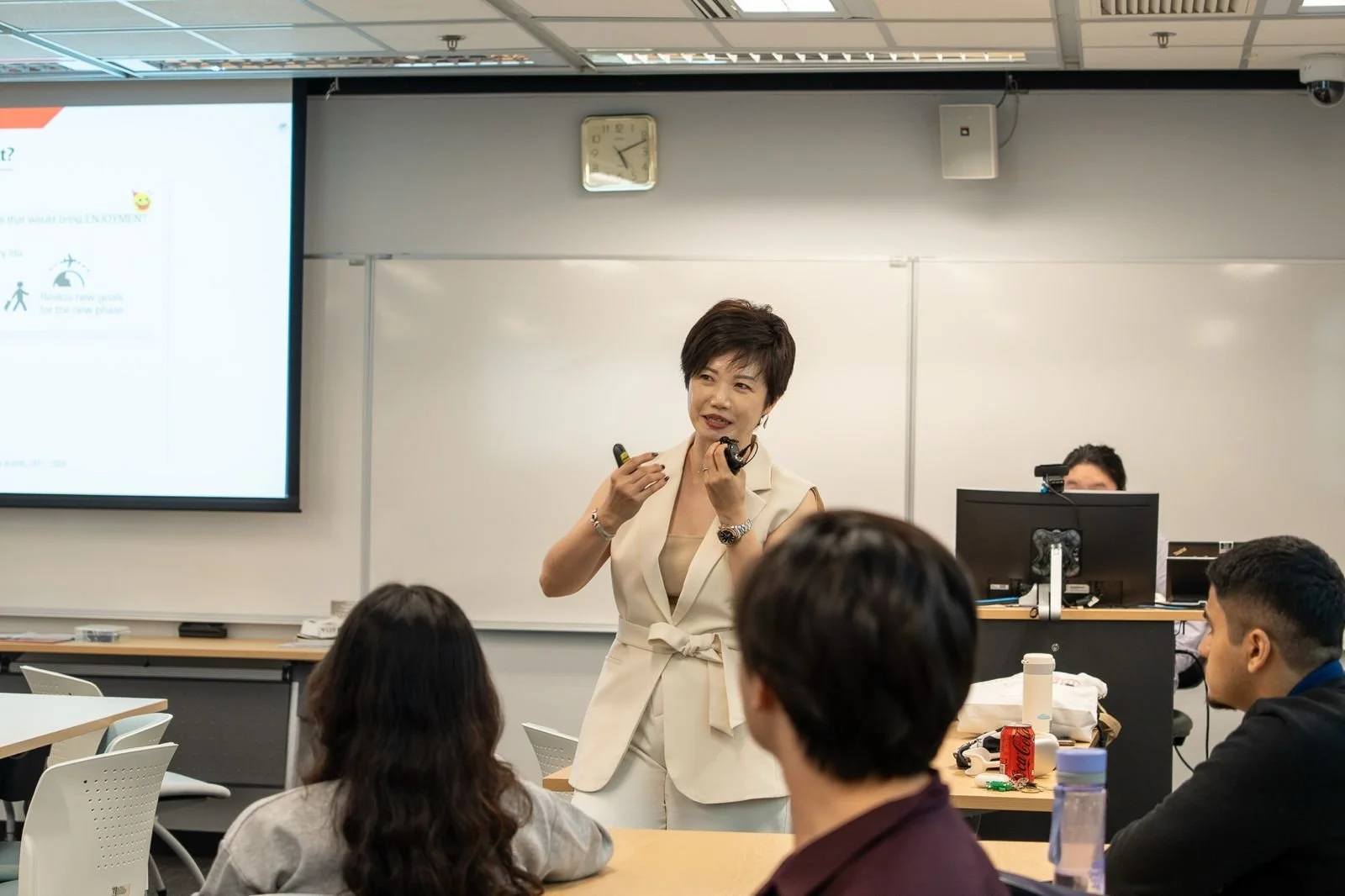Speaker Session: Josephine Cheng — Rethinking Insurance and Retirement
In this speaker session, we welcomed Josephine Cheng, the Head of Learning and Development at HSBC Life, to discuss life insurance and retirement. HSBC Life is the largest insurance provider in Hong Kong and has held the number one market share for 14 consecutive quarters. The company also operates as a major provider in other regions globally, including the Middle East and Southeast Asia. Under Ms. Cheng's leadership, the training team at HSBC Life has gained a stellar reputation in the industry, winning the Bloomberg Insurance Academy of the Year award for six consecutive years.
Ms. Josephine Cheng speaking to our students.
Rethinking Insurance
Many people hold common misconceptions about life insurance, often reducing it to a simplistic notion: "I die, someone gets paid," or labeling it as a "scam." Unfortunately, many of our students echo these sentiments. However, Ms. Cheng clarifies that the modern reality reveals life insurance to be a sophisticated financial tool designed to safeguard against potential financial risks. Since its emergence in the 17th century as basic death protection for sailors and merchants, life insurance has evolved significantly over the past four centuries. It now serves not only to secure loved ones but also as an important tool for financial planning, wealth accumulation, retirement planning, and legacy building, underscoring its crucial role in contemporary financial strategies.
Interconnection of Wealth and Health
Is wealth or health more important? This provocative question was posed by Ms. Cheng during the session. While some may choose one over the other, she argues that both are critical for attaining a high quality of life in our later years. Research shows that financially stable individuals are less likely to experience declines in physical and mental health compared to those who are financially unfit. According to the National Institutes of Health, wealthier individuals, on average, enjoy a life expectancy that is about 8 to 9 years longer and are less likely to experience disability. Moreover, when financially fit individuals do face health declines, their financial resources can afford them superior healthcare and treatment options. For example, cancer patients with financial means have access to advanced treatments such as immunotherapy and proton therapy, while those with limited resources may only receive traditional treatments like chemotherapy. The aging process can transition from one of enjoyment and fulfillment to one of hardship and struggle, highlighting the vital link between financial stability and overall well-being in later years. Therefore, insurance becomes an essential tool for enhancing financial security in this stage of life.
Future of Retirement
What is retirement? Traditionally, retirement has been defined as the point at which an individual leaves the workforce and stops working for pay, typically after reaching a certain age. This transition often involves ceasing regular employment and pursuing other interests, as well as accessing pension benefits, social security, or other retirement savings to support one's lifestyle post-employment. Ms. Cheng redefines retirement as the stage when individuals no longer need to rely on a regular salary to maintain their lifestyle, regardless of age. She also introduces the concept of "mini-retirement," which acts like a gap year between periods of regular employment and is gaining popularity in the workforce.
What financial planning is needed to achieve the retirement you desire? Ms. Cheng highlights three key requirements: first, life protection for you and your loved ones; second, medical coverage to ensure treatment costs are managed; and third, income generation to maintain your lifestyle even when you are not actively working. Life insurance plays a crucial role in fulfilling these requirements, making it an invaluable tool for retirement planning, whether you opt for traditional retirement or newer concepts like mini-retirements.
Future of Insurance Planning
As our understanding of retirement and aging continues to evolve, HSBC and Ms. Cheng aspire for the understanding of insurance to evolve as well. HSBC Life is at the forefront of innovation, developing AI-powered mobile tools to enhance insurance planning. One notable feature allows health tracking through integration with Apple Watch, rewarding users with premium discounts for meeting specific health goals. This initiative not only promotes healthier lifestyles but also aligns insurance incentives with personal well-being. The overarching goal of these tools is to provide users with personalized, AI-driven advice on their insurance coverage needs while facilitating market comparisons. By leveraging technology, HSBC Life aims to simplify the insurance planning process and empower individuals to make informed decisions about their financial security.
Dear readers, I hope you learned as much from this speaker session as we did. As we conclude this article, I leave you with a few questions to consider: What are your thoughts on life insurance? Do you prefer these new retirement concepts, or do you lean toward traditional forms of retirement? Does the idea of being a "roving retiree"—living in different countries throughout retirement—appeal to you? Would you prefer receiving insurance advice from an AI rather than a human agent?
To learn more about retirement and retirement planning, check out our other articles on the website.

